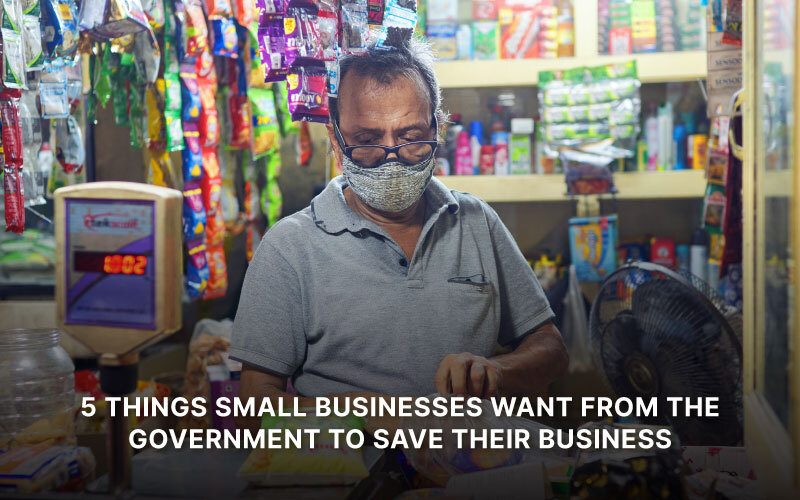In just 1 year, small businesses saw the worst happen to their business and somehow managed to battle all the odds. However, the second wave of the coronavirus and another lockdown have upset several small businesses. While businesses are working on crisis strategies to keep business moving, they also want the Government to help them out.
What small businesses want from Government to save their businesses
1. Extension to ECLGS Scheme –
The retail and hospitality sector took the worst hit last year when the business shut down. Hotels and restaurants closed down, along with shopping malls. This time, the retail sector, dominated by MSMEs has submitted a plea to the Finance Minister requesting an extension on the Emergency Credit Line Guarantee Scheme.
Only recently, several sectors made back the losses they incurred in the last year, but once again, the new lockdown has had over 80% of stores and businesses closing shop.
“ With zero revenues retailers are still expected to pay overheads such as salaries, electricity, and rentals. If a timely relief package is not provided by the government to ease the financial stress, then the industry will find it hard to survive this second wave.” – Kumar Rajagopalan, CEO of Retailers Association of India
2. Ease of compliance rules
The sectors have also asked Government to help ease compliance, especially with regard to income tax. On April 5th, The Punjab Government has already scrapped 479 compliances, earlier required for seeking various approvals and renewals by industrialists. A lot of compliance requirements require tons of paperwork and any delay in payment of fees results in huge penalties.
Compliance norms may seem like a lot to process, fortunately, there are companies like Legalwiz.in and Vakilsearch who help with this. In fact, if you sign up on Instamojo, you get direct access to Legalwiz services via our app store. You can also take a free course on mojoVersity to understand compliance better and avoid penalties.
3. Moratorium on principal and interest
Worried that their investments could become Non-Performing Assets if the Government does not help in managing the business’s working capital, all MSMEs want the Government to put a temporary hold on principal and interest on loans for 6 months.
These MSMEs have also asked the Government to increase working capital loan limits by 30%, in order to pay employees wages and salaries.
Know more about small business cash flow loans
4. Monitoring raw material prices
Suppliers of small businesses have resorted to increasing the prices of raw materials and goods ever since the pandemic hit. MSMEs have requested the Government to create ‘war rooms’ where authorities can check the prices of the key raw materials used by the sector.
5. Extending GST payments
Finance Minister Nirmala Sitharaman received please from small businesses asking to extend GST payments and return filing deadlines for the month of March, April, and May to June 30, 2021.
Just yesterday, the Government announced reduced penalties and waiver of late fees on delayed GST payments.
Govt. announces various relief measures for taxpayers under #GST law in view of severe #COVID19 pandemic:
Reduction in rate of interest
Waiver of late fee
Extension of the due date of filing GSTR-1, IFF, GSTR-4 and ITC-04
Details: https://t.co/DOw81aqHhT pic.twitter.com/yNhOpIgTgS
— PIB India (@PIB_India) May 2, 2021
What MSMEs are currently doing to save their business –
MSMEs have proven that they do not need sole dependence on the Government to help their business survive the global pandemic. Already, a lot of small businesses have learned business lessons that they are implementing to ensure that they are prepared for the worst.
Upskilling
Several small business owners are learning how to file taxes, maintain inventory, and other skills needed to run operations smoothly. In the last year alone, over 80% of SMEs registered for a skills-based online course. For example – an increased number of entrepreneurs registered for mojoVersity – a free e-learning platform started by our team and we recorded an 11X increase in rolling out certificates and a 10X increase in active students during the lockdown.
Entrepreneurs are taking to online courses to build useful skills. On mojoVersity, you can learn to maintain GST invoices, the basics of email marketing, and more. Plus, it is completely free.
Managing cash flow
Working capital is the number one problem for small businesses when there is a lockdown. Poor working capital and cash flow management resulted in workers not getting paid, and daily operations getting impacted.
This time around, MSMEs are saving money, keeping track of their cash flow, and paying employees on time. If your business is looking to manage your cash better, it helps to do a little reading over the weekend and manage your cash flow better.
Going online
eCommerce has proven to be a blessing for businesses time and again. Small businesses can now set up an online store in 2 minutes. Setting up an eCommerce store helps you –
- Maintain e-invoices better with different vendors
- Track payments of different customers
- Reach out to customers outside your locality, state, and even country
- Carry out GST compliance easily
- Deliver products easily with shipping partners
- Keep in touch with customers better
- Engage in marketing your brand across different platforms
Creating an online store is not rocket science, all you need is a little guidance. We offer free and premium online stores for small business owners based on your preference. Set up your free online store and upgrade whenever you like.


